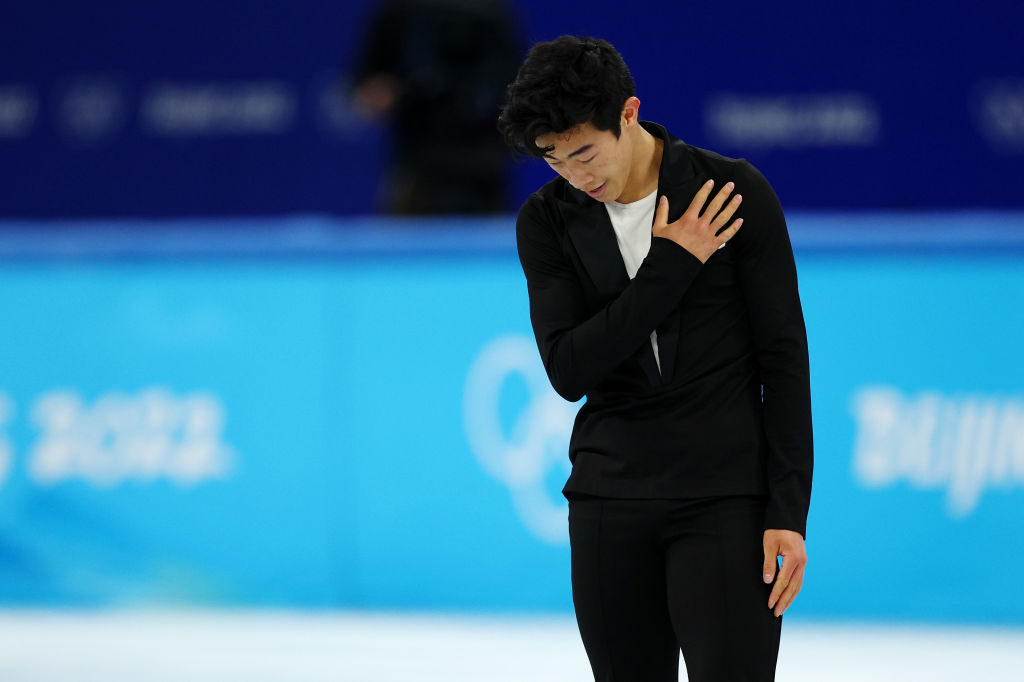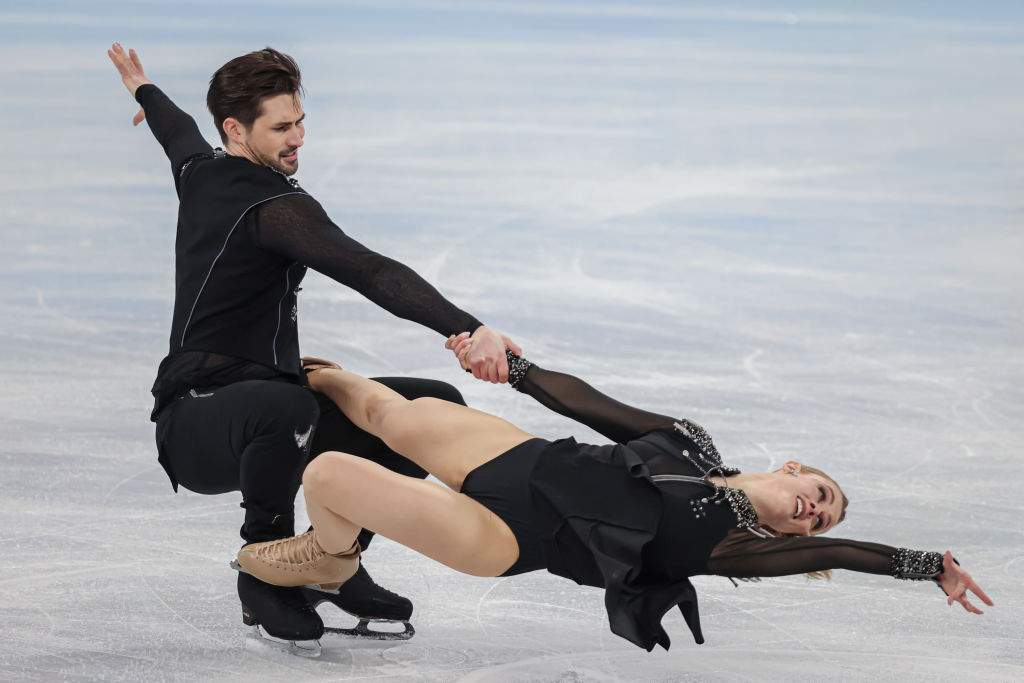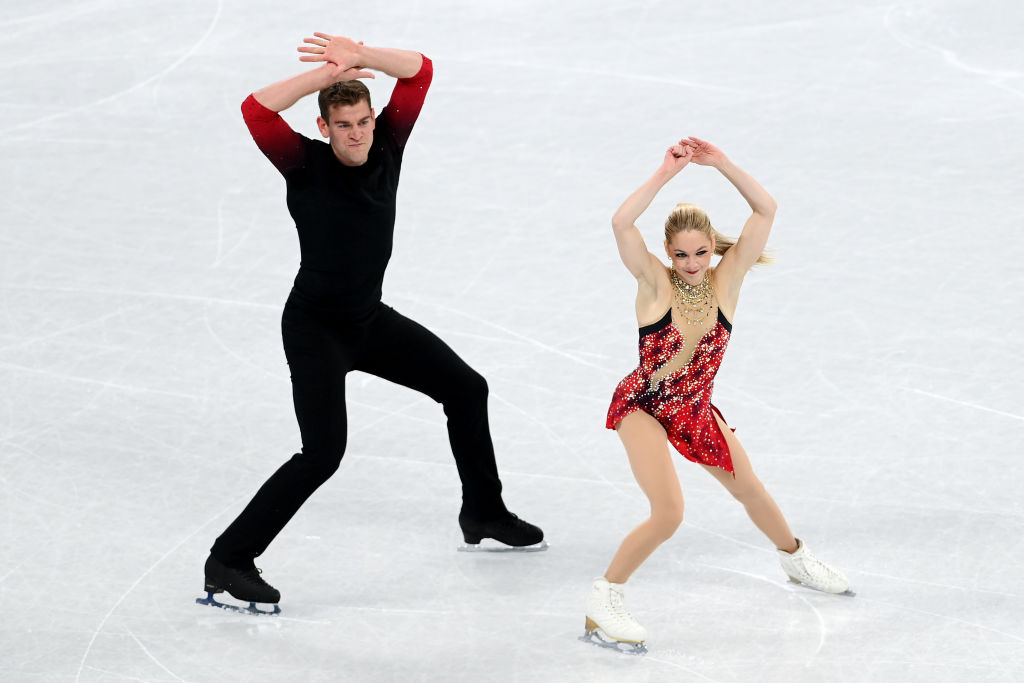
Past the halfway point in his short program, American Nathan Chen finally shook a monkey off his back.
As he whipped around four times in his quadruple Lutz-triple toe combination jump, the last in his program, it was as if Chen cast aside the regret, disappointment and missed opportunity that had haunted him since the last time he skated a short program—and fell or missed jumps—at the Olympics.
Chen’s cleanly skated short program earned him a monster score of 111.71—a personal best, and just shy of the highest short program ever recorded at an international competition. His statement-making skate set the stage for a stunning night of programs for the remaining U.S. athletes. Ice dancers Madison Hubbell and Zachary Donohue and pairs team Alexa Knierim and Brandon Frazier each also set personal best scores.
Those performances put the U.S. team in a good position for making the podium in team figure skating. After three of the eight competitions that make up the team event, the U.S. stands in first place, with 28 out of 30 possible points. The Russian Olympic Committee is in second with 26 points, and host country China is in third with 21.
Chen’s performance should also give him a critical sense of confidence heading into the men’s singles short program, which beings on Tuesday. “I still have a lot ahead of me,” he said. “Of course I am very, very happy. I might not be the most emotive person, but deep down, I am happy.”

U.S. in strong position in team skating
The skaters are judged using regular figure skating scoring, but the highest scoring skater will earn 10 points for their country, the next highest scorer nine points, and so on toward the team’s total tally. Only the teams with the five highest points total will advance to the finals, which will be determined by the free programs. The first place finishes by Chen and Hubbell-Donohue earned the U.S. 10 points each—while Knierim-Frazier’s third place added eight points, giving the U.S. 28 points after the first day, enough to lead the pack going into the second day of competition.
The team event is skated over three days, and kicks off the 11 figure skating events at the Beijing Winter Olympics. As one of the first events of the Games, the team event is already foreshadowing the disruption that COVID-19 will likely have on the competition, and potentially on who ends up on the podium — the German and Ukrainian teams had to make last-minute adjustments after skaters tested positive in Beijing.
READ MORE: Your Complete Guide to Figure Skating at the Beijing Olympics
Following the men’s short program, the ice dancers performed their rhythm dances, which were required this season to reflect “street styles.” That can include everything from hip-hop and funk to blues. If there had been more than 800 people in Beijing’s Capital Indoor Stadium, the more familiar music—Elvis, Michael and Janet Jackson, and Elton John—would have had the audience on their feet. But performing even for the sparse crowd and the judges, the U.S.’s Hubbell and Donohue edged out the Russian Olympic Committee’s (ROC) Victoria Sinitsina and Nikita Katsalapov to win their segment. Italy’s Charlene Guignard and Marco Fabbri finished in third.
Hubbell and Donohue displayed the raw power and speed that they’re known for, and have refined since moving to Montreal to train with Marie-France Dubreuil and Patrice Lauzon in 2015. Skating to a medley of “Nasty” and “Rhythm Nation” by Janet Jackson, it was clear that they benefited from working with a dancer on Jackson’s Rhythm Nation tour; they perfectly translated the crispness of Jackson’s choreography to the ice while maintaining impressive coverage and flow between their skills. The effort pushed them past the current world and Olympic world champions Sinitsina and Katsalapov, a huge statement for the Americans who finished just off the podium at the last Olympics in the ice dance competition. “We felt like there was opportunity here not only to set ourselves up for our own personal accomplishment in medaling, but giving that gift to our other Team USA athletes,” says Hubbell. “We all carry that responsibility but also that privilege. We certainly wanted to do our part. This was a particularly wonderful way to begin the Games.”
Russian skater Katsalapov took responsibility for their second place finish, after a slight bobble toward the end of the program. “I gave first place to my competitor for free,” he said. “But only today. With just this one mistake, I’m really annoyed, but we learned a lesson.”
Good news comes in pairs

While pairs is historically the weakest discipline for U.S. skaters—no American pairs team has won a world championship medal since 2002, or an Olympic medal since 1988 (both were bronze)—Knierim and Frazier didn’t let that bother them. That’s despite the fact that they have only been skating together for a few years and were forced to withdraw from the U.S. national championships in early January after Frazier tested positive for COVID-19. They also earned a personal best with a clean, solid skate that placed them in third. “I’m so proud of us,” Knierim said afterward. “We had a lot of pressure within us that we had to push down, and trying to ignore it. But we really rose to the occasion today.”
The pairs portion of the team event previewed what will likely be a showdown in the pairs competition between Wenjing Sui and Cong Han of China, and Anastasia Mishina and Aleksandr Galliamov of Russian Olympic Committee for gold; Sui and Han made a statement with a fierce, aggressively skated program to the Mission Impossible theme that set a new short program score record, topping the previous one held by Mishina and Galliamov. The Russians seemed stunned by their scores, and the fact that they finished behind the Chinese pair. But, they may have another opportunity to compete against the Chinese couple during the free program of the team event—if both are chosen for that portion. They will also face off during the pairs short and free programs on Feb. 18 and 19.
Challenges ahead
Next in the team event is the women’s short program, on Sunday, Beijing-time. Those scores will determine which five countries with the highest points will continue to compete in the finals, where skaters will perform their free programs, beginning with the men. For the U.S., the strong start is critical, since the women’s squads from ROC and Japan are strong, especially in the free programs; whoever of the three Russian women is chosen to skate is likely to perform at least one, if not several quadruple jumps, and none of the American women have included them in their programs this season.
Coaches can name any of the skaters on their Olympic squads to skate in any of the team events; so they can decide that the same men’s or women’s skater, or pairs or dance team will compete in both the qualifying and final segments. Or, they can break up who skates in each event to give skaters a chance to compete on Olympic ice before their individual events. There is also a bit of gamesmanship involved; team leaders have to calculate the best formula for staying ahead of the competition, without exhausting their strongest competitors. If a skater competes in both events in the team competition, for example, they would then end up skating four programs, including their individual event, in a matter of days. That could be a challenge, especially if they want to skate four clean programs. There’s a fine line between getting more experience skating a routine—or riding the momentum of a strong start, as the U.S. has—and overdoing it.
The final will be held on on Monday, when the countries with the top five point total will field women, pairs and ice dance teams to skate their free programs. The women’s portion could be history-making, if one of the Russian women becomes the first female skater to land a quadruple jump at the Olympics—and could determine who stands at the top of the podium for the team event.
More Must-Reads from TIME
- Donald Trump Is TIME's 2024 Person of the Year
- Why We Chose Trump as Person of the Year
- Is Intermittent Fasting Good or Bad for You?
- The 100 Must-Read Books of 2024
- The 20 Best Christmas TV Episodes
- Column: If Optimism Feels Ridiculous Now, Try Hope
- The Future of Climate Action Is Trade Policy
- Merle Bombardieri Is Helping People Make the Baby Decision
Contact us at letters@time.com